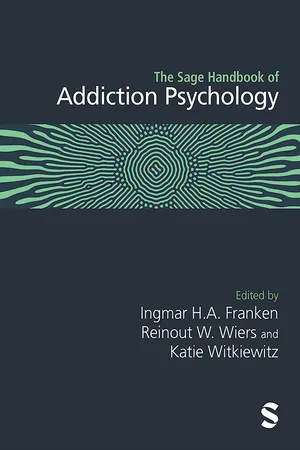
The Sage Handbook of Addiction Psychology
- 688 pages
- English
- ePUB (mobile friendly)
- Available on iOS & Android
The Sage Handbook of Addiction Psychology
About this book
The Sage Handbook of Addiction Psychology presents a comprehensive overview of the state of the science behind the psychology of addiction, offering a crucial resource for psychologists engaged in both research and practice.
The Handbook features a distinguished international group of contributors, all renowned specialists in their respective fields and emphasizes a forward-looking perspective. Chapters delve into psychological theories of addiction and evidence-based addiction treatment, offering practical insights on the intricacies of addiction psychology.
The handbook takes a holistic approach by incorporating neighbouring fields traditionally outside of psychology; it explores economics, genetics, public health, neurobiology, computer science, and sociology, recognizing that psychology and individual-centered perspectives are just one facet of addiction. This multifaceted approach ensures that readers gain a broad understanding of the psychology of addiction, fostering a comprehensive and nuanced comprehension of this complex subject.
With Substance Use Disorders ranking among the most prevalent mental health concerns globally, this handbook, designed from the ground up for students and researchers, is an essential resource for those seeking a deep understanding of the field of addiction psychology.
Part 1. Background, including history and epidemiology.
PART 2. Vulnerability, including psychological, environmental, and biological factors.
PART 3 Interventions
PART 4 Specific addictions
PART 5 Future directions
Frequently asked questions
- Essential is ideal for learners and professionals who enjoy exploring a wide range of subjects. Access the Essential Library with 800,000+ trusted titles and best-sellers across business, personal growth, and the humanities. Includes unlimited reading time and Standard Read Aloud voice.
- Complete: Perfect for advanced learners and researchers needing full, unrestricted access. Unlock 1.4M+ books across hundreds of subjects, including academic and specialized titles. The Complete Plan also includes advanced features like Premium Read Aloud and Research Assistant.
Please note we cannot support devices running on iOS 13 and Android 7 or earlier. Learn more about using the app.
Information
Table of contents
- Cover
- Half Title
- Title Page
- Copyright Page
- Contents
- About the Editors and Contributors
- Introduction to The Sage Handbook of Addiction Psychology
- Part 1 Background
- 1 The History of Addiction Concepts: From ‘Addiction’ to ‘Addictions'
- 2 Addiction, Brain Disease and Free Will
- 3 The Epidemiology of Substance Use and Substance Use Disorder
- 4 Epidemiology of Behavioral Addictions
- 5 A Brief Overview of the Developmental Epidemiology of Substance Use and Disorder
- 6 Health Equity Considerations for Drug and Alcohol Addiction Research and Treatment
- Part 2 Vulnerability & Mechanisms
- 7 Contemporary Psychological Theories of Addiction: Focusing on Learning, Memory and Cognitive Processes
- 8 Cognitive Models of Addiction
- 9 Behavioral Economics of Addiction: A Reinforcer Pathology Approach
- 10 Stress and Addictive Disorders: Drug- and Stressor-related Effects on Stress Biological and Psychological Response
- 11 Trauma and Addiction
- 12 The Role of Impulsivity in Addictive Behavior
- 13 Early Life Risk Factors of Substance Abuse and Substance Use Disorder
- 14 Adolescent Development and Vulnerability for Addiction
- 15 Beyond the Individual: Considering Contextual Factors in Addiction Psychology
- 16 The Genetic Basis of Addiction
- 17 Mapping Brain Structure and Function in Addiction: A Narrative Review of Neuroimaging Studies
- 18 The Relevance of Animal Studies for Human Addiction
- Part 3 Interventions
- 19 Preventing Substance Use
- 20 Public Health Interventions for Addiction
- 21 Using Brief Motivational Interviewing as an Early Intervention for Reducing Risk of Substance Use Problems and Substance Use Disorder in Young People
- 22 Psychological Interventions for Addictive Behaviors
- 23 Care for Chronic Patients Using Harm Reduction Strategies
- 24 Cognitive Bias Modification as Add-On to the Treatment of Substance Use Disorders
- Part 4 Specific Addictions
- 25 Alcohol Use Disorder
- 26 Tobacco Smoking Addiction and Nicotine Dependence
- 27 Opioid Use and Misuse: An Overview
- 28 Stimulant Use Disorders
- 29 The Epidemiology of Cannabis Use
- 30 Gambling Addiction
- 31 Gaming Disorder and Other Online Addictive Behaviors
- 32 Eating Addiction
- Part 5 Future Directions
- 33 Value and Potential of Network Models for Conceptualizing, Assessing and Treating Addiction and Co-occurring Disorders
- 34 Identity and Addiction
- 35 To Flourish or Flounder: The Relation between Meaning in Life and Addiction
- 36 Psychedelic Therapy in the Treatment of Addiction
- 37 Neuromodulation (Brain Stimulation) Technologies for Treatment of Substance Use Disorders
- 38 Artificial Intelligence in Substance Use Research
- Index